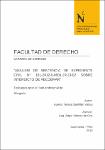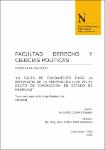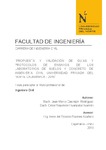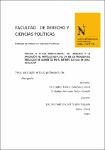Mostrar el registro sencillo del ítem
Análisis de sentencia de expediente civil N° 181-2012-0-0601-JR-CI-02 sobre interdicto de recobrar
| dc.contributor.advisor | Montes de Oca, Ángel | |
| dc.contributor.author | Santillán Valqui, Aurelia Teresa | |
| dc.date.accessioned | 2019-06-12T01:08:39Z | |
| dc.date.available | 2019-06-12T01:08:39Z | |
| dc.date.issued | 2018-09-14 | |
| dc.identifier.citation | Santillán, A.T. (2018). Análisis de sentencia de expediente civil N° 181-2012-0-0601-JR-CI-02 sobre interdicto de recobrar (Tesis de licenciatura). Repositorio de la Universidad Privada del Norte. Recuperado de http://hdl.handle.net/11537/21618 | es_PE |
| dc.identifier.other | TES 346.005 SANT 2018 | es_PE |
| dc.identifier.uri | https://hdl.handle.net/11537/21618 | |
| dc.description.abstract | RESUMEN El interdicto de recobrar es una de las figuras jurídicas con las que se protege la posesión de un bien. En el caso de estudio, se observa la aplicación de esta institución y en conjunto con otras figuras jurídicas que hace crear convicción en el juez de primera instancia al momento de sentenciar. En cambio, el pronunciamiento de la Sala Superior, sorprende en gran medida al desarrollar de manera equivocada al interdicto de recobrar, aludiendo el tema de propiedad y pretendiendo ampliar requisitos para acceder a esta institución. Afortunadamente, la Sala Suprema corrigió este error, explicando muy detalladamente la aplicación del interdicto. Así como señalar la amplitud de la violencia en la desposesión, punto transcendental para que se les dé la razón a los demandantes. Asimismo durante la tramitación del proceso se observan actuaciones de mala fe que hacen dilatar el proceso, como la presentación de escritos, medios de prueba, que por ser un proceso sumarísimo no correspondía, y uno de los actos en los que se observa una mayor intención de dilación es al momento de interponer un recurso de apelación a la resolución que ordena se ejecute lo ordenado por la Sala Civil Permanente, señalándose que debe iniciarse un proceso de ejecución, algo completamente descabellado. Postergándose el acceso a la justicia de los demandantes. De este proceso se aprende a delimitar bien las diferencias entre posesión y propiedad, a aplicar otras instituciones que ayuden a la defensa del caso y a presentar oportunamente las pruebas. | es_PE |
| dc.description.abstract | ABSTRACT The restraining order is one of the legal concepts with which the possession of a property is protected. In the case of study, we observe the application of this institution and in conjunction with other legal figures that creates conviction in the judge of first instance at the time of sentencing. On the other hand, the pronouncement of the Superior Chamber, is surprising to a large extent when developing wrongly the restraining order, alluding to the property issue and pretending to expand requirements to access this institution. Fortunately, the Supreme Court corrected this error, explaining in very detail the application of the interdict. As well as pointing out the extent of the violence in the dispossession, transcendental point to give the reason to the plaintiffs. Also during the processing of the process are observed bad faith actions that delay the process, such as the presentation of writings, evidence, which is a summary process did not correspond, and one of the acts in which a greater intention is observed of procrastination is at the moment of filing an appeal to the resolution ordering the execution ordered by the Permanent Civil Chamber, indicating that an execution process must be initiated, something completely crazy. Delaying access to justice for the plaintiffs. From this process one learns to clearly delimit the differences between ownership and ownership, to apply other institutions that help defend the case and to present the evidence in a timely manner. | es_PE |
| dc.description.uri | Tesis | es_PE |
| dc.format | application/pdf | es_PE |
| dc.language.iso | spa | es_PE |
| dc.publisher | Universidad Privada del Norte | es_PE |
| dc.rights | info:eu-repo/semantics/openAccess | es_PE |
| dc.rights | Atribución-NoComercial-CompartirIgual 2.5 Perú | es_PE |
| dc.rights.uri | https://creativecommons.org/licenses/by-nc-sa/2.5/pe/ | * |
| dc.source | Universidad Privada del Norte | es_PE |
| dc.source | Repositorio Institucional - UPN | es_PE |
| dc.subject | Derecho civil | es_PE |
| dc.subject | Codigo civil | es_PE |
| dc.subject | Codigo procesal civil | es_PE |
| dc.subject | Derecho procesal civil | es_PE |
| dc.subject | Sentencias | es_PE |
| dc.title | Análisis de sentencia de expediente civil N° 181-2012-0-0601-JR-CI-02 sobre interdicto de recobrar | es_PE |
| dc.type | info:eu-repo/semantics/bachelorThesis | es_PE |
| thesis.degree.grantor | Universidad Privada del Norte. Facultad de Derecho y Ciencias Políticas | es_PE |
| thesis.degree.level | Título Profesional | es_PE |
| thesis.degree.discipline | Derecho y Ciencias Políticas | es_PE |
| thesis.degree.name | Abogado | es_PE |
| dc.publisher.country | PE | es_PE |
| dc.subject.ocde | https://purl.org/pe-repo/ocde/ford#5.05.01 | es_PE |
| thesis.degree.program | Pregrado | es_PE |
| dc.description.sede | Cajamarca | es_PE |
| renati.discipline | 421056 | es_PE |
| renati.level | https://purl.org/pe-repo/renati/level#tituloProfesional | es_PE |
| renati.type | https://purl.org/pe-repo/renati/type#tesis | es_PE |
Ficheros en el ítem
Este ítem aparece en la(s) siguiente(s) colección(ones)
-
Tesis [54]






